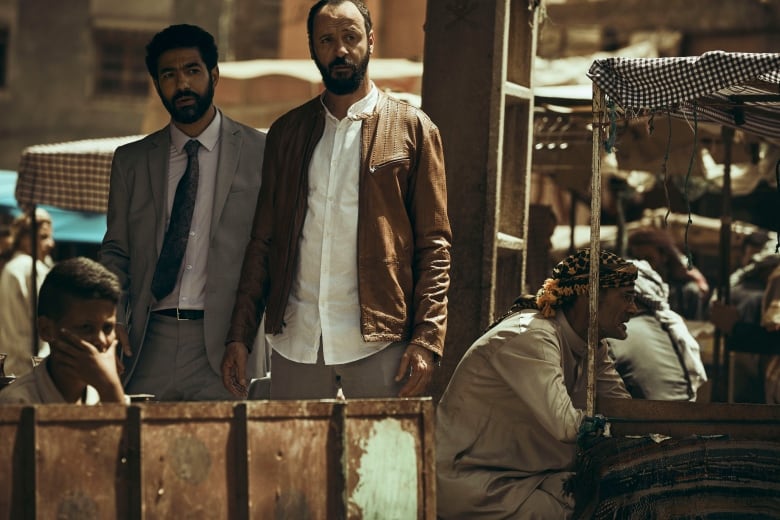Amazon's Jack Ryan is about fighting terrorism — but can it battle stereotypes?
Some shows 'reinforce the pre-conceived ideas that many viewers hold about Muslims'

The first episode of Jack Ryan might have you on the edge of your seat with its action-packed scenes. But it might also make you cringe and wonder if the new series is just another show depicting an all-too-familiar villain in the Middle East.
John Krasinski — who stars in the Amazon Prime Video series as the terrorism-fighting CIA hero from Tom Clancy's bestselling novels-turned films, such as The Hunt for Red October and Patriot Games — says he, too, has grown tired of seeing stereotyped portrayals.
He wants to reassure the audience that Jack Ryan steers clear from the "archetypal, moustache-twirling terrorist representation."
"The entire storyline becomes about the collateral damage of people who make evil decisions like this," Krasinski said in a phone interview from London, England.
The net effect will be to reinforce the narrative, to reinforce the pre-conceived ideas that many viewers hold about Muslims."- Ramzi Kassem, law professor and former
The first season of this new espionage series focuses on ISIS connections in Syria, Yemen and France — the latest in a line of TV thrillers with mass appeal such as Homeland and the 24 franchise depicting antagonists who are predominantly Muslim and based in the Middle East.
"It's actually their families and friends and all of the people around them in the town who had nothing to do with this. And so we really humanize the whole idea through the eyes of his wife … seeing the family involvement," said the actor-filmmaker, also seen earlier this year in his hit thriller A Quiet Place.

Fictional characters, real-world consequences
"Those working in mainstream cultural production need to know that the discourse they shape actually carries real-world consequences," says Ramzi Kassem, a law professor at the City University of New York. His scholarship and research topics include terrorism, mainstream media and race.
"It doesn't matter so much that these characters are shown to love their mother or their children or strawberry ice cream," Kassem said.
"A writer might throw in some humanizing traits, they might even throw in some background to explain why someone might be driven to an act of violence, but that's all too little too late … The net effect will be to reinforce the narrative; to reinforce the pre-conceived ideas that many viewers hold about Muslims."
Kassem has been a staunch critic of various portrayals on screen of marginalized communities, including films like Zero Dark Thirty and American Sniper, and the popular TV series Homeland. He eventually became a consultant for Homeland's sixth season in 2017 after the show reached out to him for feedback.

Hollywood reaching out for help
It's a trend that seems to be growing in Hollywood.
With the demand for more nuanced characters and social media backlash regarding perceived lack of authenticity, films and TV series are starting to consult with community representatives to ensure more accurate portrayals.
"[Showrunners and producers] have been reaching out to us," said Sue Obeidi, who heads up the Hollywood bureau of the Muslim Public Affairs Council in the U.S. "In the past, that wasn't the case. We always had to reach out to them."
Obeidi says the bureau, whose mandate is to expand the narrative of Islam in the entertainment industry, has noticed a marked difference in outreach following the 2016 U.S. election. In the years since, the group has consulted on projects such as Aladdin, The Looming Tower, Grey's Anatomy and, most recently, Jack Ryan.
We've shifted from damage control to brainstorming ideas for storylines or inclusion of a Muslim character- Sue Obeidi, head of U.S. Muslim Public Affairs Council's Hollywood bureau
"We've shifted from damage control to brainstorming ideas for storylines or inclusion of a Muslim character," she said.
"We are getting phone calls from TV networks, from film studios saying, 'We have this project and we want a Muslim director and a Muslim screenwriter.'"
While Obeidi wouldn't share the details of her involvement with Jack Ryan, she said the studio did its "due diligence."

Blunders still happen
The upcoming action-drama — which premieres Aug. 31 and also stars Wendell Pierce, Abbie Cornish and Ali Suliman — had shoot locations in Montreal, Washington and parts of Morocco, a predominantly Muslim country. Despite the team's attempts at cultural sensitivity, however, Krasinski acknowledged one significant blunder.
"The day we landed [in Morocco] was the day that [the Islamic month of] Ramadan started and we were shooting through Ramadan," Krasinski said, admitting that the timing wasn't ideal.
"Literally the day we left was the day Ramadan ended so it wasn't the greatest planning."

Krasinski recalled local crews working long days while fasting from sunrise to sunset, which is common practice for the duration of the month.
"We had to be very mindful and respectful to not bring out a huge lunch in front of the crew," he said.
"But I did feel bad for anybody working a full day in the hot sun."
Obeidi says progress is slow but small steps are better than none.
"We are nowhere where we need to be — that includes other underrepresented communities, not just Muslims — but as far as Muslim narratives are concerned, we are noticing a change."